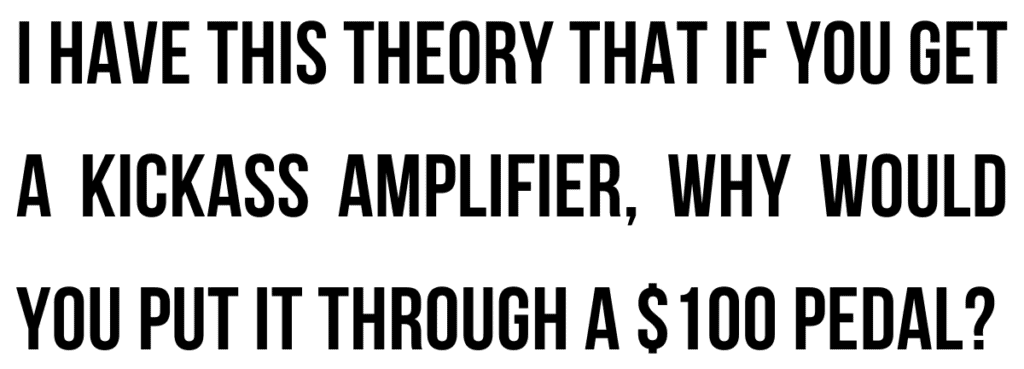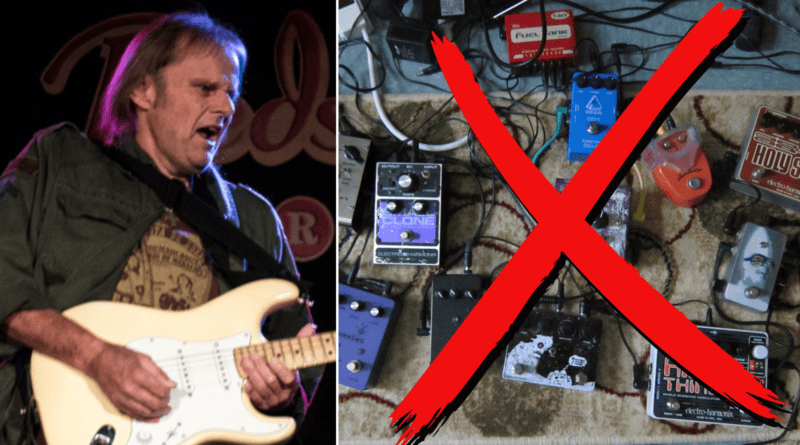Walter Trout, the legendary guitar player known for working with the likes of John Lee Hooker, Canned Heat, and John Mayall’s Bluesbreakers, recently appeared on the new edition of the Pedalpocalypse. But despite the show’s name, it turns out that Mr. Trout is not into pedals. Like, at all.
During the show, which is a collaboration between Guitar World, MusicRadar, and Guitar Player, the guitarist discussed his amp preferences, saying (via Guitar World):
“What I use for pedals is my vintage Mesa/Boogie Mark IV. I just don’t see any need for pedals. I have this theory that if you get a kickass amplifier, why would you put it through a $100 pedal?”

During the episode, the show presented Walter with the usual question — to pick only three pedals to take into a hypothetical lockdown. He simply answered:
“Er, none.”
Further on, he discussed whether he ever used any pedals during his career, saying:
“When I started playing in bars in the middle-to-late ’60s, pedals didn’t exist. At the time, I was playing through a Fender Super Reverb which I still have out in my garage, and I wanted to get a little more out of it.”
“At that time a pedal came out by Electro-Harmonix called an LPB-1. It was just a gain boost and it plugged right into the input on your amp. It stuck out from the front of the amp – it was very elemental and kind of primitive – but I would plug that into the Super.”
As he further explains, having a booster pedal was great for getting a dirty tone with the usual amps of the era in a club setting. There was no need to crank them. He offered:
“I would turn the volume down on the Super and just run the LPB-1 cranked and it was great for playing in clubs. When I discovered Mesa/Boogies while I was with John Mayall, I realised that basically it’s a Fender that’s been very souped-up and modified and the overdrive is built into the amp.”
LPB-1, or “Linear Power Booster,” is one of the oldest guitar effects and Electro-Harmonix still makes them. However, the old version from back in the day wasn’t a pedal but rather a box that goes directly into an amp. Here’s what that looked like.
When asked how he controls things at this point in his career, whether there’s an amp footswitch or whether he relies entirely on guitar controls, Walter replied:
“I control it all with the volume button. I have the amp set on Channel 3, which is the high-gain channel. I have the gain all the way up and I’m controlling the cleanliness and the whole thing with the volume on the guitar and I play all the time with my pinky wrapped around the volume button.”
The super straightforward old-school approach to guitar signal isn’t that common, although some guitar players prefer it. Another legend who seems to share Walter’s approach, at least to an extent, is Joe Bonamassa. Back in 2017, Bonamassa reflected on the massive modern-day use of guitar effects and said:
“I’ve really gotten over pedals. I can’t keep up with this craze of boutique pedals that make you sound like everything but your guitar. I can’t get my head around it.”
“So you don’t want to play a guitar [properly] so you buy a box that makes it sound like an algorithm like you just fired up your computer and you can spend the night staring at your fuckin’ shoes? C’mon man…”
“I know I’ll get shit for saying this, but it’s fucking lazy. It’s insulting to people who spent 35 years playing and learning, like a lot of players. And we continue to work at it! These guys can barely play a chord but call themselves soundscapists. Get the fuck outta here! It’s bullshit.”
“There’s so much masking and spin going on there. Can we get real for a minute? What do you actually play? Pick up an acoustic guitar… try that!”
Going back to 2020, Walter Trout discussed his approach to amplifiers and other gear in an interview, particularly on his album “Ordinary Madness.” Asked about what he used on the record, he replied:
“I worked deliberately at creating different moods and different textures for each song. So I wanted to explore more of the palette of sounds that was possible because I had some amazing gear to experiment with.”
“The solos are all done with my stage setup, which is a Mesa Boogie Mark IV played through a 4 x 12 open back Boogie cabinet. I used my touring Stratocaster for all the solo work. We record at Robby Krieger’s studio in LA and he gave me access to his guitar and amp collection.”
“For example, on the song ‘Heartland,’ I wanted it to have a kind of Americana feel. I said to Michael Dumas, who runs the studio, ‘I think think the rhythm track should be a Telecaster.'”
“He walked in two minutes later with a paisley Telecaster and said, ‘Here is one of James Burton’s guitars.’ To get a different rhythm sound, I then played the telecaster through one of Robby’s old Fender Bassman amps.”
“On another song, I wanted a good acoustic sound, and Michael walked in with a beautiful, custom-made Gibson and told me, ‘Here is Dwight Yoakam’s old guitar that he gave to Robby.’ So I think this album has the most varied guitar sounds on it of any of my previous records.”
Further on, asked about digital modeling amps, Walter explained that he’s not against them and thinks that they can sound great. However, he’s not personally into them. He explained:
“I’ve done some shows with some younger bands who are using modeling amps, and they seem to get great sounds out of them.“
“But I am old-school and I go back to my tube amplifiers with no pedals. But that’s just me. To each his own!”
Photos: Roberta (Walter Trout 04 (19915671769)), Oldangelmidnight (Oldangelmidnight’s Guitar pedals, 2011-10-29 16.34.51)


